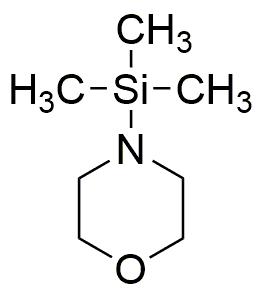4-(Trimethylsilyl)morpholine is widely utilized in research focused on:
- Synthetic Chemistry: This compound serves as a versatile reagent in organic synthesis, particularly in the formation of complex molecules. Its ability to stabilize reactive intermediates makes it invaluable for chemists developing new compounds.
- Pharmaceutical Development: In drug discovery, it acts as a protecting group for amines, facilitating the synthesis of pharmaceutical agents. This application is crucial in creating compounds with enhanced bioactivity and selectivity.
- Material Science: It is used in the production of silicone-based materials, contributing to the development of flexible and durable polymers. These materials find applications in coatings, adhesives, and sealants.
- Analytical Chemistry: The compound is employed as a derivatizing agent in gas chromatography, improving the detection and quantification of various analytes. This enhances the accuracy of analytical results in laboratories.
- Electronics Industry: It plays a role in the formulation of silicone resins used in electronic components, providing thermal stability and electrical insulation. This is essential for the reliability of electronic devices.
General Information
Properties
Safety and Regulations
Applications
4-(Trimethylsilyl)morpholine is widely utilized in research focused on:
- Synthetic Chemistry: This compound serves as a versatile reagent in organic synthesis, particularly in the formation of complex molecules. Its ability to stabilize reactive intermediates makes it invaluable for chemists developing new compounds.
- Pharmaceutical Development: In drug discovery, it acts as a protecting group for amines, facilitating the synthesis of pharmaceutical agents. This application is crucial in creating compounds with enhanced bioactivity and selectivity.
- Material Science: It is used in the production of silicone-based materials, contributing to the development of flexible and durable polymers. These materials find applications in coatings, adhesives, and sealants.
- Analytical Chemistry: The compound is employed as a derivatizing agent in gas chromatography, improving the detection and quantification of various analytes. This enhances the accuracy of analytical results in laboratories.
- Electronics Industry: It plays a role in the formulation of silicone resins used in electronic components, providing thermal stability and electrical insulation. This is essential for the reliability of electronic devices.
Documents
Safety Data Sheets (SDS)
The SDS provides comprehensive safety information on handling, storage, and disposal of the product.
Product Specification (PS)
The PS provides a comprehensive breakdown of the product’s properties, including chemical composition, physical state, purity, and storage requirements. It also details acceptable quality ranges and the product's intended applications.
Certificates of Analysis (COA)
Search for Certificates of Analysis (COA) by entering the products Lot Number. Lot and Batch Numbers can be found on a product’s label following the words ‘Lot’ or ‘Batch’.
Numéro de catalogue
Numéro de lot/série
Certificates Of Origin (COO)
This COO confirms the country where the product was manufactured, and also details the materials and components used in it and whether it is derived from natural, synthetic, or other specific sources. This certificate may be required for customs, trade, and regulatory compliance.
Numéro de catalogue
Numéro de lot/série
Safety Data Sheets (SDS)
The SDS provides comprehensive safety information on handling, storage, and disposal of the product.
DownloadProduct Specification (PS)
The PS provides a comprehensive breakdown of the product’s properties, including chemical composition, physical state, purity, and storage requirements. It also details acceptable quality ranges and the product's intended applications.
DownloadCertificates of Analysis (COA)
Search for Certificates of Analysis (COA) by entering the products Lot Number. Lot and Batch Numbers can be found on a product’s label following the words ‘Lot’ or ‘Batch’.
Numéro de catalogue
Numéro de lot/série
Certificates Of Origin (COO)
This COO confirms the country where the product was manufactured, and also details the materials and components used in it and whether it is derived from natural, synthetic, or other specific sources. This certificate may be required for customs, trade, and regulatory compliance.


